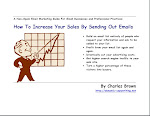Freelance copywriters should ask their readers more direct questions throughout their advertisements, web copy and direct mail pieces. A question forces a reader to think, to ponder and to become engaged in the message being communicated.
About a decade ago, I was extremely ill with a life-threatening disease that had me out of commission for several months. During this time, I slept most of the day on our sofa in the living room while our small children played around me.
I could sleep through all sorts of clammer without waking up. But if my wife or one of the boys asked a direct question like, “Daddy can you help me with my homework?” or “Daddy, have you seen my (fill in the blank) toy?” I woke out of my slumber at least long enough to answer the question.
The point is, even in a deep sleep my mind recognized a question was being asked of me and pulled me back into the land of the living.
So why do you think questions have such power to engage the mind?
Before I answer that, did you notice what your brain just did? Even though you knew I was using the question to manipulate you subtly to pull you deeper into this article, you still most likely paused to contemplate the answer.
And in all likelihood, the answer you came up with was something along these lines: Questions focus the mind. They pull scattered pieces of information and experiences from different areas of the mind and attempt to assemble these pieces into a conceptual idea.
Think back to your education. Why did some teachers have a greater impact on you than others?
My guess (and possibly yours too, as you paused once again to consider another of my clever questions) is because the really good teachers asked thought-provoking questions throughout the class period. These questions helped you to assemble the information you were studying and formed a deeper layer of learning.
Contrast that to the teachers who just lectured. These teachers simply spewed out information and expected you to take copious notes and regurgitate those facts on an exam.
Lecturers, at best, merely convey raw facts and information, but fail to connect that information to the world around us. Questioners help students to conceptualize and organize information within our brains.
But how do questions help freelance copywriters? Simply this: the ultimate aim of marketing material is to influence people to act, whether that means to buy, request information or join a cause.
But people are not led to act on facts and data alone. They must be engaged. Questions help readers to internalize the message you are communicating and consider, “what will it cost me to go another day without this XYZ widget?” Or, “How can I make sure I have a secure retirement income?”
I like to think of the unengaged reader as not very different from the person who sits through a poignant sermon at church and leaves thinking, “I sure hope my wife was listening, because she really needed to hear that message.” The communication bounces right off that person because it was never internalized.
So how can a communicator (whether you are a freelance copywriter, a teacher or a preacher) make use of questions? First, the questions must provoke thought.
Questions that merely call for a one word, or a yes-no answer do not fit the bill. An engaging question demands that the person assemble various bits of information, and sometimes their own experiences, to come up with an answer.
In copywriting some of the best questions force a person to confront their own need for your product. It makes them realize that they need the benefits your product offers to solve a problem or to bring about a needed change.
So make use of this powerful tool in the freelance copywriter’s toolbox. Can you imagine how much better that will make your writing?
COPYRIGHT © 2006, Charles Brown

Labels: copywriting



0 comments:
Post a Comment